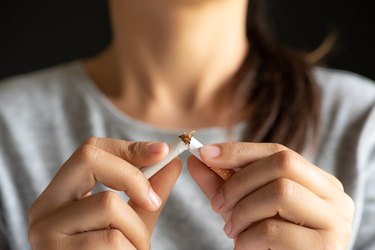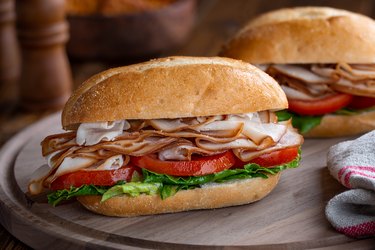
If you have a uterus, odds are you may develop a fibroid — a smooth muscle tumor — during your lifetime. Nearly 70 percent of people assigned female at birth (AFAB) have these noncancerous growths (also called leiomyomas or myomas) by the age of 50, according to Harvard Health Publishing.
While many folks don't even know they have fibroids, they "are a slowly progressive condition and rarely 'clear up on their own,'" says ob-gyn James A. Gohar, MD, co-founder and CEO of Viva Eve.
Video of the Day
Video of the Day
But many cases are manageable without medical intervention. "Only approximately 30 percent of women with fibroids have symptoms that necessitate treatment," Dr. Gohar says.
For the other 70 percent of people, simple lifestyle changes can help manage certain fibroids.
Here, Dr. Gohar discusses the most promising home and natural remedies to reduce your risk of fibroids (or cope with existing ones), plus when you should see a doctor if you're dealing with more serious fibroid-related symptoms.
1. Exercise Regularly

Working out can be a great way to manage fibroids.
Here's why: "Staying active helps stave off excess weight," Dr. Gohar says. And this matters because "fat cells can make high amounts of estrogen, which can increase the size of fibroids," he explains.
Let's be clear: There's no exercise that shrink fibroids. But by maintaining a healthy weight through staying active, you may also be able to keep your fibroids from growing larger and causing complications.
2. Drink Green Tea

Sipping on green tea may help you temper fibroids too.
"Green tea contains a compound called EGCG," Dr. Gohar says. A powerful antioxidant, EGCG might help reduce inflammation, which can contribute to many health conditions, including fibroids, he says.
Warning
Keep in mind that green tea contains caffeine, which isn't right for everyone. People with heart problems or who take certain medications like blood thinners, for example, should limit their intake.
3. Eat More Fruits and Veggies

While it's debatable whether specific foods can directly help with fibroids, a balanced diet that includes fruits and vegetables can be valuable when you're trying to keep your fibroids in check.
That's because "fruits and vegetables often come with a healthy dose of fiber, which may possibly be beneficial for fibroid management.," Dr. Gohar says.
"Foods high in fiber can help you feel fuller, which can help with cravings, excessive snacking or overeating," Dr Gohar explains. And remember, "maintaining a healthy weight can be a way to minimize the growth of fibroids," he says.
Additionally, packing plenty of produce on your plate may be protective against fibroids as "fruits and vegetables are full of antioxidants, which are anti-inflammatory," Dr. Gohar adds.
4. Try Turmeric

"It is not yet scientifically proven that turmeric helps with fibroids, but turmeric may have anti-inflammatory properties," Dr. Gohar says.
That means it can't hurt to sprinkle this spice into your foods, which might help you minimize inflammation in the body and, as a result, serve to manage your fibroids.
Related Reading
5. Get Adequate Vitamin D

Vitamin D may help reduce your risk of fibroid issues.
"Several clinical studies have produced compelling evidence that vitamin D is an effective antitumor agent," Dr. Gohar says. Indeed, "researchers have found that fibroid cell growth regressed when subjected to high concentrations of vitamin D," he says.
The problem is, up to 42 percent of Americans are lacking in vitamin D, according to Cleveland Clinic Mercy Hospital. The recommended daily amount of vitamin D is 600 international units (IU) for people between the ages of 19 and 70, per the National Library of Medicine.
For fibroid management, choose foods rich in vitamin D. These foods include, per the National Library of Medicine:
- Fatty fish such as salmon, tuna and mackerel
- Beef liver
- Cheese
- Mushrooms
- Egg yolks
- Fortified milk, breakfast cereals, orange juice and dairy products
6. Prioritize Stress Management

"Stress can make any medical condition feel worse," Dr, Gohar says. And fibroids are no different.
That's because chronic stress can contribute to inflammation in the body. Which is why it's important to manage stress through healthy habits such as daily exercise, Dr. Gohar says.
Yoga, meditation and deep breathing are also solid stress-management strategies too.
7. Quit Smoking

Puffing on cigarettes produces a plethora of health problems. And now you can add fibroids to this long list.
While a direct connection has not yet been adequately studied, "tobacco use is linked to a variety of other tumors, and fibroids are a type of benign smooth muscle tumor," Dr. Gohar says.
Mark this as just one more reason to quit smoking.
8. Slash the Salt

Excessive salt is not your friend when it comes to fibroids (and many other health issues for that matter).
Some studies done in China have shown that people who eat many processed foods (which contain additives like sodium) or pickled foods (which also tend to be on the salty side) may be more prone to developing fibroids, according to Harvard Health Publishing.
So, do your fibroids a favor and go easy on the salt and high-sodium foods. You can manage your sodium intake by checking food labels: Anything with a 20 percent daily value (DV) or above is considered a high-sodium food.
9. Limit Alcohol

"Drinking alcohol, particularly beer, may make you more prone to developing uterine fibroids," Dr. Gohar says. "According to evidence gathered from the Black Women's Health Study, there is a link between consuming alcohol, particularly beer, and the development of uterine fibroids in Black women," he says.
The takeaway: "If you're concerned about fibroids, you might want to reduce your alcohol intake, especially beer, to once a week or less," Dr. Gohar says.
When to Seek Medical Treatment for Fibroids
If your fibroids are affecting your quality of life, you shouldn't just grin and bear it. See your doctor whenever you experience one or more of the following symptoms, Dr. Gohar says:
- Heavy bleeding
- Painful menstrual cycles
- Pain with sex
- Pelvic pressure or bloating
- Pelvic pain and discomfort
- Frequent urinary symptoms
"It is a common misconception that you must have all these symptoms to qualify for treatment when, in fact, you only need one significant symptom to benefit from expert medical management," Dr. Gohar says.
"One should also seek the guidance of a medical professional if they are planning to get pregnant, as fibroids can sometimes impact that as well," he adds.
Types of Treatment for Fibroids
If you require more than simple lifestyle changes to manage your fibroids, there are many therapies available, depending on your case and its severity. Here are the treatment options:
1. Fibroid Hormone Treatment
"Fibroid hormone treatment targets the hormones that regulate the menstrual cycle in order to shrink fibroids and slow their growth," Dr. Gohar says. "When hormone production decreases, fibroids shrink, and symptoms improve."
2. Uterine Fibroid Embolization
"Uterine fibroid embolization (UFE) is a minimally invasive, nonsurgical procedure for the treatment of fibroids that has been performed successfully for over two decades," Dr. Gohar says. "It is an effective alternative to surgery and hormonal treatment, and those wishing to avoid a hysterectomy should discuss this option with their doctor."
3. Radiofrequency Ablation
This minimally invasive treatment heats fibroids to shrink them and, ultimately, relieve your symptoms, according to Weill Cornell Medicine.
4. Laparoscopic/Robotic Myomectomy
"Laparoscopic/robotic myomectomy may be chosen as a treatment option if you have smaller and fewer fibroids," Dr. Gohar says. The procedure is minimally invasive, "keeping the incisions as small as possible, which leads to less pain, fewer complications and a much faster recovery."
5. Hysteroscopic Myomectomy
Also called a vaginal myomectomy, "a hysteroscopic myomectomy is a minimally invasive procedure to remove submucous fibroids or endometrial polyps found in the uterine cavity while leaving the uterus intact," Dr. Gohar says. "When hysteroscopic myomectomy is performed, no incisions are used, so the recovery is quick, and the complications are very rare," which makes this option especially advantageous for people in their childbearing years, he says.
6. Open Myomectomy
"Open myomectomy is a surgical procedure that is often reserved for larger fibroids and involves the excision of the fibroids from the uterus and subsequent repair of uterine tissue," Dr. Gohar says.
7. Hysterectomy
A hysterectomy is the surgical removal of a person's uterus.
"While hysterectomy is the second most common surgery performed on reproductive-age women in the U.S. after cesarean section, it's estimated that 20 percent of all hysterectomies are unnecessary," Dr. Gohar says.
That's "because physicians are under-utilizing alternative treatments" and less-invasive methods to treat benign fibroids, such as UFE, he explains.
Is this an emergency? If you are experiencing serious medical symptoms, please see the National Library of Medicine’s list of signs you need emergency medical attention or call 911.


